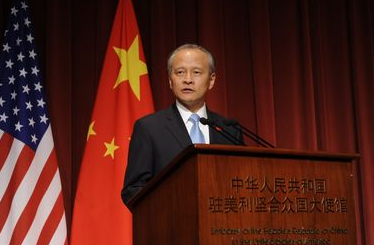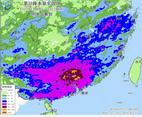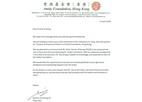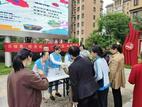China's Ambassador to the US Cui Tiankai has been nothing but confused on who really is speaking over Trump's trade remarks.
"We never wanted a trade war, but if somebody started a trade war against us, we have to respond and defend our own interests," Ambassador Cui Tiankai said on Fox News Sunday in a rare US television appearance.
His comments arise amid high political and economic tensions between the world's two largest economies, with officials from both nations having traded ever-harsher barbs in recent weeks.
Not denying anything, Cui confirmed reports that China has grown frustrated in trade talks because of what seems to be "conflicting signals" from the Trump administration. Cui said other ambassadors in Washington also shared the same frustration.
"They don't know who was the final decision-maker in the administration", he said. "Of course, presumably the president would take the final decision. But who is playing what role? It can be very confusing."
He also talked about a recent incident in which a US navy ship, in a so-called "freedom of navigation" exercise, sailed close to a disputed island claimed by China in the South China Sea.
"This is a very good example of American intervention into Chinese internal affairs," Cui said, adding that US officials would not be pleased if Chinese warships entered the Gulf of Mexico.
Cui also dismissed as "groundless", a term suggested by Vice-President Mike Pence, that China has arranged an effort to meddle in US domestic affairs.
The speech was ramped on October 4, with Pence saying Beijing has created a "a whole-of-government approach" to sway American public opinion, including spies, tariffs, coercive measures and a propaganda campaign. His comments were some of the most critical about China by a high-ranking US official in recent memory.
Following the speech, a few months later, an increase in tariffs was imposed by Washington and Beijing that have ballooned to cover hundreds of billions of dollars in bilateral trade.
In a recent interview with National Public Radio, Cui said the US has "not sufficiently" dealt in good faith with the Chinese on trade matters, saying "the US position keeps changing all the time so we don't know exactly what the US would want as priorities".
The escalating trade row was seen as a contributing factor to last week's global market rout that sent the S&P 500 and other major US indexes to their worst performances in months.
Meanwhile, according to White House economic director Larry Kudlow, he said that, on the same show that US President Donald Trump and Chinese President Xi Jinping will "probably meet" at the G20 summit in Buenos Aires in late November.
Cui states that he was present at two previous meetings of Xi and Trump, and that top-level communication "played a key role, an irreplaceable role, in guiding the relationship forward". Notwithstanding the current tensions the two have a "good working relationship," he said.
So far, talks with China on trade have been "unsatisfactory," Kudlow said. "We've made our asks" on allegations of intellectual property theft and forced technology transfers, he added. "We have to have reciprocity."








